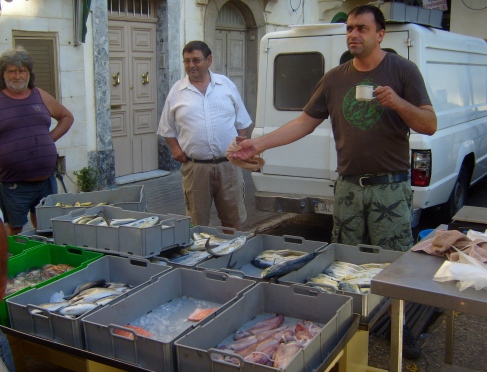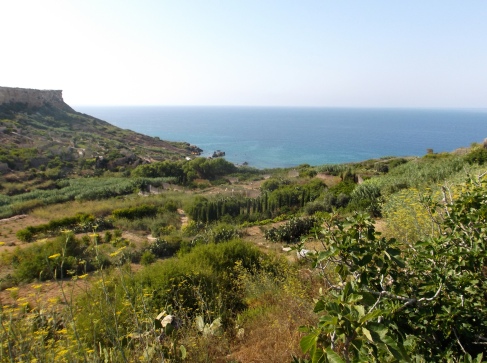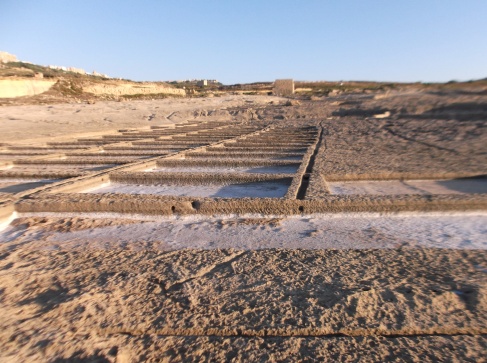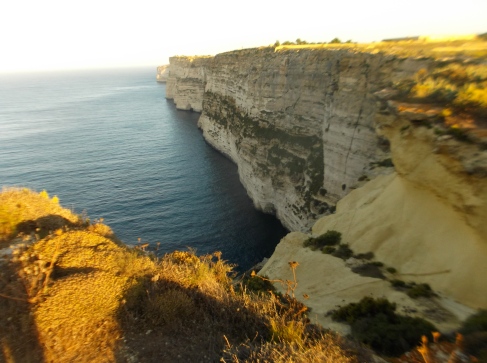For a number of years, I have visited the island of Gozo in the Mediterranean, and I have become very attached to its culture, its landscape and its society. I will try to explain what makes this little island special.
Gozo is one of the three largest islands of European Union Member state Malta, the other ones being the main island Malta and a third, smaller, island called Comino. Malta is not yet a Member of IUCN, but the Malta Environmental Protection Agency – MEPA – is in discussions about Government Agency membership. Gozo is, what you could call, the bread basket for Malta – this is where most of the agricultural production takes place that supports the population. Malta is also a fishing nation, and most of the ports on Gozo are still fully operational.
Much of the economic development of Malta is related to foreign trade and tourism, and this has resulted in large, mass-tourism infrastructure on the main island. Yet, Gozo is still relatively unspoilt. The Government has realised this and has launched an initiative called Eco-Gozo (www.ecogozo.com). The idea behind this programme is to reduce the carbon and water footprint, promote eco-tourism, protect the traditional values of the Gozitan society and maintain the landscape of the island. In reality, it has so far focused on landscaping roundabouts, road verges and parks, but the intent is to do a lot more, as described on the Eco-Gozo website. The opportunity to turn the island into a real ecological destination is obvious to any visitor.
What can a small island like Gozo provide in the way of ecosystem services? One the one hand there is the possibility to maintain and restore historical services like water storage in underground systems and wetlands. Gozo is an outcrop of limestone in the Mediterranean Sea, and therefore there is potential for subterranean water storage. In the past, fresh water was collected from wells and reservoirs that were recharged during the rainy season. Rainwater harvesting was a standard practice, with channels dug into the rock, and water collected from roofs of agricultural structures. Nowadays, more than half of the fresh water in Malta is provided by treating seawater through reverse osmosis plants – energy demanding and dependent on imports of hydro-carbons.
With high cliffs, strong winds and almost guaranteed sun every day during the summer, the potential for renewable energy on Gozo is high, but this is not yet fully explored. Individual roofs of private dwellings start to show solar panels for power generation or water heating, but this is not yet accepted as the norm. MEPA (www.mepa.org.mt) is promoting renewable energy, and this is also one on the components of the Eco-Gozo initiative, but not yet every citizen in Gozo has been convinced about the benefits of alternative energy options.
Historically, Gozo used to have a thriving sea-salt industry. This activity has been revived, and tourists now buy “locally produced” sea salt, but there are still other salt pans lying idle.
Quality control of sea salt may be an issue, but attractive packaging and improved publicity now provides a growing market. Similarly, Gozo tourists buy liquor produced from local cactus fruits, tomato paste produced from locally grown tomatoes, jars of naturally grown capers and more recently bottles home-grown wine. I visited a small enterprise on the way to Marsalforn – the ta’mena estate – which is producing a range of local produce grown on their land, and both Gozo Cottage and Jubilee Foods sell locally produced food with no additives. There is great potential for upscaling these individual initiatives, to reach an international market.
Finally, a small island with stunning scenery provides opportunities for eco-tourism. When I was on Gozo, I met the director of a new enterprise, Gozo Adventures (www.gozoadventures.com) which has discovered a niche for individual tourists who want to go hiking in the countryside, kayaking along the coast, abseiling from the cliffs or diving to see the marine biodiversity.
In my view, Gozo should avoid becoming a mass-tourism destination, but should focus on individuals and small groups that have an interest in the landscape, nature and culture of the island. There are a few hotels on the island, and so far, the tourism infrastructure has been well managed. I believe that increased demands for tourist accommodation can be met with low density developments.
The biodiversity on the islands is rather special, and there are many endemic species on Gozo. IUCN has carried out a number of studies and assessments on biodiversity in the Mediterranean through its Centre for Mediterranean Cooperation (www.iucn.org/about/union/secretariat/offices/iucnmed), and I have been told that the rich marine life around the islands makes it one of the best diving spots in the region. Hunting of birds has always been a controversial issue on Malta, and while the membership of the EU has curtailed rampant hunting excesses, there is still a vivid discussion about the protection of migratory species and the rights of local hunters. A clear zoning plan to define management regimes for the different parts of the island would help, but such a plan is not yet fully in place.
Similarly, there are hot debates about fishing, and the role of Maltese fishing boats in commercial fishing in the Mediterranean. There are two individual Marine Protected Areas on Gozo, and while MEPA is working on a coastal planning strategy, there is no Integrated Coastal Zone Management plan of the island.
All-in-all, Gozo is a case study of ecosystem services and the island provides many examples of nature-based solutions for economic development.
Please let me know if you have ever visited the island and what you think




Hi Hans
It would be useful to explore here whether the type of economy you are suggesting is actually self-sufficient. I was under the impression that Gozo still benefited from subsidies from Malta and all that undesirable mass tourism – which has the benefit of a positive economic contribution. Is the type of economy you describe viable or is it a romantic idyll that can only exist if supported by significant financial transfers from a ‘proper’ economy – unattractive and visually blighted though that certainly is.
Dear Joe
I don’t have the answer to your question of self-sufficiency, and I agree that it would be very interesting and worth-while to carry out an economic study to assess the viability of an eco-tourism future for Gozo.
However, as Gozo is part of the archipelago, there are trade-offs between Malta and Gozo. If Gozo is providing ecosystem services for Malta, it is only fair that Maltese or foreign visitors pay for that. I would not call that a subsidy!
I don’t object to development on Gozo, but believe it can learn from its bigger sister island in deciding what type of development and at what cost.
Hi Hans. Good point. I guess that for me “Gozo provides ecosystem services to Malta” is too vague a statement to be meaningful in the real world. I think that we need to be more concrete than that if we are to have a true impact on policy decisions.
Hi Hans,
We enjoyed reading your post about Gozo. Living here full time, we find that unfortunately the “Eco-Gozo” tag is something that the general public are baffled by. As you say, the results so far seem to be “gentification” projects – flower beds and benches etc. and we live in hope that the fine words on government websites re. water and power improvements will come before the money runs out! As such a small island the potential to do something radical is here – but at present the will to do so is not.
The one sector where we see things changing a little faster is tourism. This is simply as a growing number of tourists are rejecting hotel and beach holidays and searching out smaller boutique and family run bed and breakfasts and are wanting to see local festas and traditional crafts and try local foods and wines – or in the case of Gozo Adventures (which you kindly mention) get out and see and do things rather than lie by the pool.
This has huge potential for Gozo – sustainable tourism – guests who appreciate the local culture and lower numbers but higher spending visitors. The influence that these tourists have in demanding eco-friendly power and water and activities etc. shouldn’t be underestimated – the Maltese and Gozitans are business minded people – if they see a demand they will fill it!
Cornil and Rachel
Dear Cornil and Rachel
Glad you liked the story.
I have heard that GOZO is now trying to become a Mediterranean Cruise ship destination. I wonder what that will do for the kind of tourism activities you are promoting.
All the best
Hans
Hi Hans,
Yes – Gozo is trying for cruise ships. It means that any activities offered need to be kept short – usually 3.5 – 4 hours from the ship and back again. They do see us as a niche activity to offer – but of course the bulk of tourists on these cruises are older and don’t want to exercise – and with the need to cater for large numbers of people we’re back to the usual jeep safari solution. They have approached us about our eco and food tours – but we don’t like to go over 16 people or the quality of the experience suffers so they see us as expensive and therefore unattractive. Its all about how many for how much…………
I personally don’t believe the cruise ships bring any money to Gozo other than a few days driving work and ice-cream sales. They certainly manage to block the harbour and access roads so we keep an eye on their schedules to plan around them! The MTA / GTA etc are pushing for this, based no doubt on high visitor figures. What does it do for our kind of tourism activities? Nothing at all! But we’ll carry on with our eco friendly activities anyway as thankfully not everyone travels in this way 🙂
Rachel
Thanks for you thoughts Rachel. I am also sceptical about the value of cruise tourism to the local economy, but i would love to get some other views on this.
In my opinion, there is no single type of tourism that is desirable or that will build an economy.all tourism is made up of different groups of people seeking different experiences. A successful tourist destination is one that can successfully combine attractions for many different groups while maintaining some cohesive overall identity. Cruise ships alone will not be sufficient. But neither will Eco-tourism alone. it has been shown in many places that Eco-tourism makes a useful contribution but that is never a sufficient basis on which to build a tourist economy. Even in Costa Rica which has made this ‘a big thigh’ and has much to offer, the vast majority of tourism related income comes from other sectors – luxury developments, marinas, sport fishing, etc, etc. Eco-tourism options in Gozo should be encouraged and successful businesses can be built on it. But you cannot build a tourism economy on the back of just that. And for Eco-tourism services to succeed, one needs the infrastructure and other services that will only come from a broad-based tourism industry. Making a success of Eco-tourism involves encouraging and working with other tourism sectors. Yes – including cruise ships.
I don’t disagree Joezl – we need diversity for sure – not everyone doing just one thing. Hans was wondering what cruise ships did for our sort of tourism – which is why my answer is as it is……. Remember Gozo is just 5 x 7 miles – thousands of any type of tourist arriving at the same time and flocking to the main sights isn’t going to be pretty!
Clearly Gozo has a real possibility of bcoming a BioPositive island — i.e., an island that is managed to ensure the conservation and responsible use of biodiversity. However, Gozo and other such areas currently lack a clear way to be recognised and even certified as being BioPositive.
Though the development of a BioPositive Standard & Registry is in the works (see http://gdi.earthmind.net), it is not yet operational. Thus currently Gozo needs to review a host of schemes which could help it to have a positive impact on biodiversity, be recognised for its efforts and, importantly, secure the needed financing to make this possible.
Yes, Hans, an economic scoping study on the viability of ecotourism as well as other the provisions of ecosystem services related to water, carbon and fishing could be most useful in helping to develop a sustainable island-wide BioPositive action plan.
Jointly with i.e. the Maltese fishermen we can organise collection of floating debris under the embrella of the WasteFreeOceans Foundation.(www.wastefreeoceans.eu) on the Med and near the coastlines on hotspots.
Even more important is to educate tourists and locale to change habits and instead of throwing away waste, to collect it for recycling
Hi Hans Friederich,
having visited Gozo nearly every year since 1988, I have seen the changes taking place, not all for the better of course.
Gozo is a microcosm that shows how our human societies need to become more aware about sustainability : lose those terraced walls (they took hundreds of years to be organised like that) retaining fertile soil, and it will flush in the sea during the heavy downpours. Forget about the wells that collect rainwater during winter, and you & your crops will need more expensive sources of that rare (in Malta) resource.
The rural & frugal Gozitan way of life has disappeared, and some of this change is progress. However, the appreciation of nature and its associated wealth is still crude : witness the irrigated eucalyptus “woods” that have cropped up here and there in the last 20 years, attracting migrating birds for shooting, not watching. Witness the never-ending quarrying in many spots, and its associated traffic of heavy lorries filled with nice limestone for “traditional” homes. Witness the rubbish in many rural roads or paths, or the unbelievable increase in car ownership on this tiny island. And, talking about ecosystem services, witness the sprouting of stables with Friesian cows (not normally used to 40°C summers…) to supply the growing dairy industry, or the imported food in some “modern” shops : is all this sustainable ? On the other hand, take a bus in Gozo these days and you will be amazed by how modern, clean (they’re hybrid) and efficient they are. And for a few years now some form of recycling has been introduced.
Regulation is a dirty word today in some circles, but to progress societies need uplifting goals and a certain amount of steering, of showcasing : there are +/- 50,000 residents in Gozo, one of the Southernmost small islands in the EU, would it be so difficult to make electric cars and renewable energy (solar heat & power in particular) compulsory over the next 10 years ? Where walls are crumbling, could reasoned reforestation not provide an alternative ? Would that not attract eco-tourists, who would come to stay for one or two weeks rather than 3-4 hours like cruise tourists ? And I am sure that, educating and involving the local stakeholders, more initiatives to protect or enrich Gozo’s biodiversity & ecosystem services could be devised to make Gozo one template for a more sustainable planet, combining population density with appreciation of biodiversity and sustainability.
At present however, the choice is still not clear…